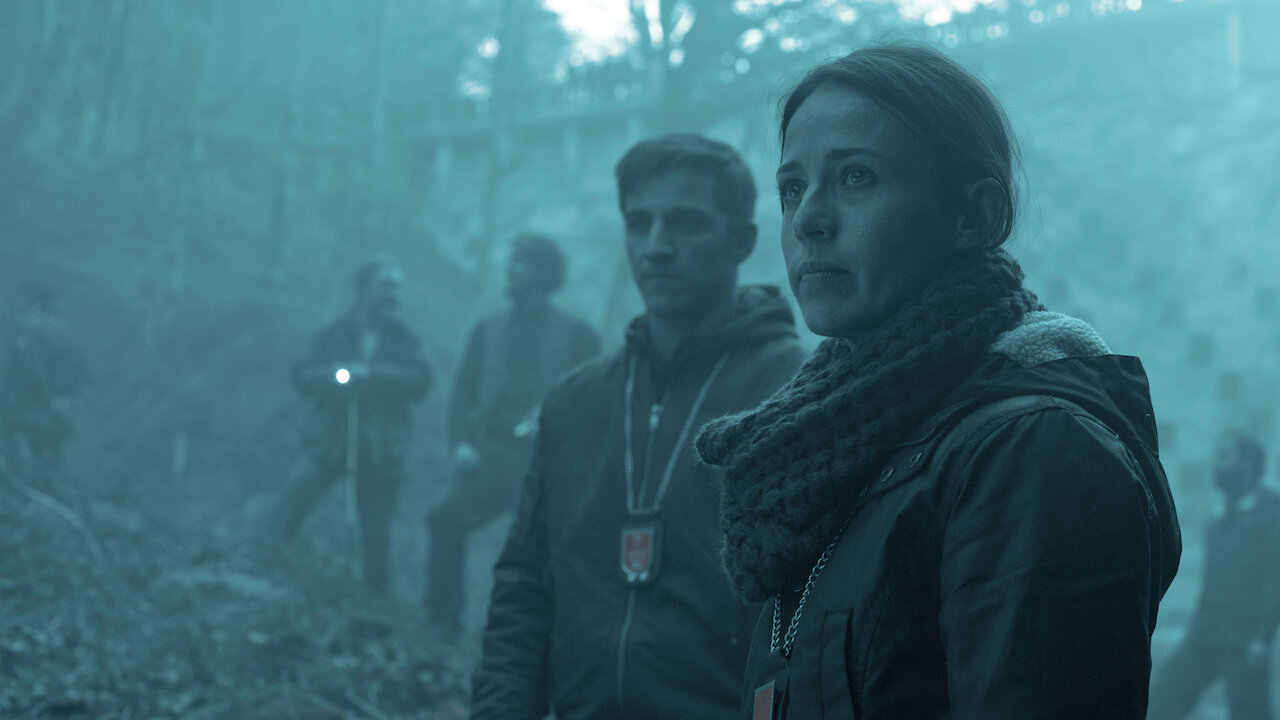 The Baztan trilogy consists of three movies, based on the novels by Dolores Redondo. The setting for these is a small area in the Basque country of Spain, not far from the border with France. Much like the small-town English villages such as Miss Marple’s St. Mary Mead, or Death in Paradise‘s Honoré, the murder rate in this charming and picturesque area appears to rival that of a South American war-zone. I guess you can describe the series as Español negro, being a Mediterranean-based version of Nordic noir. Like those, you have a detective with a troubled past, a history that frequently seeps into her current life, They are investigating crimes resulting from what’s unquestionably the darker side of human nature, and the results are uncomfortably close to home.
The Baztan trilogy consists of three movies, based on the novels by Dolores Redondo. The setting for these is a small area in the Basque country of Spain, not far from the border with France. Much like the small-town English villages such as Miss Marple’s St. Mary Mead, or Death in Paradise‘s Honoré, the murder rate in this charming and picturesque area appears to rival that of a South American war-zone. I guess you can describe the series as Español negro, being a Mediterranean-based version of Nordic noir. Like those, you have a detective with a troubled past, a history that frequently seeps into her current life, They are investigating crimes resulting from what’s unquestionably the darker side of human nature, and the results are uncomfortably close to home.
In this trilogy, the heroine is Amaia Salazar, a former resident of the region who left under circumstances best described as murky. She joined the police force, rising through the ranks and going through a successful secondment to the FBI, where she distinguished herself. Amaia is now back in Spain, with her American artist husband, James. But, as ever in this kind of thing, the pull of her past is strong. She finds herself coming back to the Baztan region in which she grew up. There, the ghosts of history are lurking and ready to pose a challenge – perhaps equal to that of solving the brutal murders which are the reason for her return.
The trilogy includes the books El guardián invisible (The Invisible Guardian), Legado en los huesos (The Legacy of the Bones) and Ofrenda a la tormenta (Offering to the Storm). From 2017 through 2020, the books were made into three movies by Atresmedia Cine and its partners. Five years after the last of the books was published, Redondo wrote a prequel, La cara norte del corazón (The North Face of the Heart), describing Amaia’s youth and her time with the FBI in America. All four novels were optioned to Heyday Films for American adaptations in October 2021, but there has been almost no news since the original announcement. Still, with the Spanish movies all available on Netflix, the need for any English-language versions is questionable in my opinion. Such things rarely improve on, or even equal, the originals.
Hence, below you’ll find reviews of the three Spanish movies in order. Note: I haven’t read the books, so there will be no further discussion of them, or comparison to the films.
The Invisible Guardian
★★★½
“It’s never sunny in Baztan.”
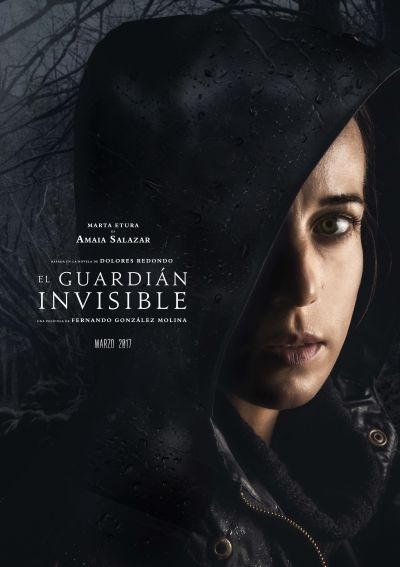 I’ve traveled a fair bit around Spain and Mediterranean Europe in my time, and the weather was never as unremittingly grim as its depicted here. Things seem to unfold in a permanent downpour. Seriously: Chris and I pretty much were turning it into a drinking game by the end: take a swig every time a scene takes place in the rain. Only concern for the health of our livers prevented us. Googling tells me Baztan is fairly wet: around 55 inches a year. But it felt like most of that arrived during the 129 minute running-time of this film. I suspect David Fincher and Se7en have a lot to answer for, with rain = dark and foreboding atmosphere.
I’ve traveled a fair bit around Spain and Mediterranean Europe in my time, and the weather was never as unremittingly grim as its depicted here. Things seem to unfold in a permanent downpour. Seriously: Chris and I pretty much were turning it into a drinking game by the end: take a swig every time a scene takes place in the rain. Only concern for the health of our livers prevented us. Googling tells me Baztan is fairly wet: around 55 inches a year. But it felt like most of that arrived during the 129 minute running-time of this film. I suspect David Fincher and Se7en have a lot to answer for, with rain = dark and foreboding atmosphere.
There’s certainly no shortage of that here, even setting meteorological considerations aside. It begins with the discovery of a young girl’s corpse by a river, stripped naked except for a local cake placed on her crotch. Pamplona detective Amaia Salazar (Etura) makes the connection to a previous murder and is sent to Baztan to take over the case. It’s the town where she grew up, and she still has family there. Though relations are still strained with her sister Flora (Mínguez), who runs a bakery in the town. She feels Amaia abandoned the family by “running off” to the United States. It’s not long before we discover their mother had issues, physically abusing Amaia as a child.
However, the main focus is the murders, with further victims turning up, all young girls whose bodies are posed in the same, ritualistic way. The investigation reveals these may be the latest in a series of killings going back fourteen years, which appear to be some kind of moral crusade by the perpetrator. Amaia gets into trouble with her colleagues, because one of the victims was having an affair with her brother-in-law, and she also conceals evidence connecting Flora’s bakery to the cake. She ends up being replaced on the case by Montés (Orella). If you think that’s going to stop Amaia, you clearly haven’t seen enough of this genre.
It does feel very much like the film could be relocated to the Scandinavian forests with very little trouble. There is some specifically local colour in the form of the “Basajaun”, a legendary – or perhaps not – creature, reputed to roam the woods. I suspect its going to play a larger part in the subsequent movies: while this does tidy up the main case, there are a number of loose ends, such as a cave containing a lot more remains. Etura does a good job of handling both the personal drama and the police elements: you may not agree with some of the choices, yet you can see why she made them. Amaia has been through hell, and that she still made something of her life is an admirable trait. A solid enough opening, which even lured Chris off her phone.
Dir: Fernando González Molina
Star: Marta Etura, Elvira Mínguez, Carlos Librado “Nene”, Francesc Orella
The Legacy of the Bones
★★★★
“Skeletons in the closet”
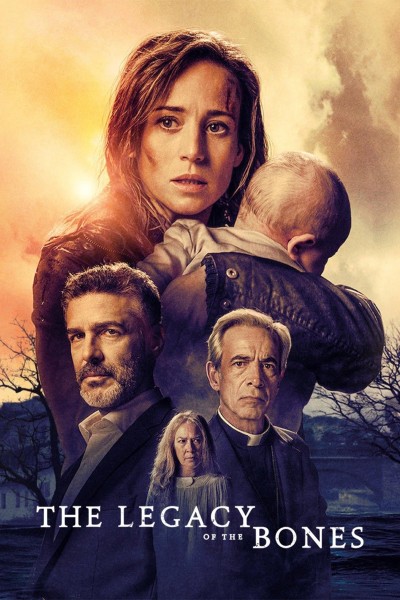 We jump ahead about a year for the second installment. Amaia Salazar (Etura) has now had the baby she announced she was expecting during the first film, and is adjusting to the need for balance between her career and motherhood, with her husband, James. After completing her maternity leave, she returns to work, and is put on a case of church desecration with cult undertones, at the request of the enigmatic Fr. Sarasola (Arias). This is tied to the Cagots, a historically persecuted group native to the region. Simultaneously, there is an ongoing string of murderers committing suicide, each leaving behind a one-word message: “Tartalo”. It’s a reference to a baby-eating giant from Basque mythology, and seems to be linked to the cave of remains found in the previous film.
We jump ahead about a year for the second installment. Amaia Salazar (Etura) has now had the baby she announced she was expecting during the first film, and is adjusting to the need for balance between her career and motherhood, with her husband, James. After completing her maternity leave, she returns to work, and is put on a case of church desecration with cult undertones, at the request of the enigmatic Fr. Sarasola (Arias). This is tied to the Cagots, a historically persecuted group native to the region. Simultaneously, there is an ongoing string of murderers committing suicide, each leaving behind a one-word message: “Tartalo”. It’s a reference to a baby-eating giant from Basque mythology, and seems to be linked to the cave of remains found in the previous film.
Both cases take a deeply-personal turn, reflecting the family of Amaia’s long-standing association with the area. When tested for DNA, the bones left on the church altar are a match for her genetics, and her abusive mother Rosario (Sánchez), now kept in a psychiatric facility, scrawls “Taratalo” on the floor of the room in blood, after attacking an orderly. Amaia is forced to uncover some very unpleasant truths about the history of her family – and, indeed, the way the region in general dealt with children perceived as unwanted or problematic. Her newborn son becomes part of the scenario as it unfolds, pushing the heroine close to the edge, as she picks her way towards solving the crimes of both the past and present.
This goes into some thoroughly dark places, building on the heavy atmosphere set up in the previous movie. For example, we already knew that Rosario is dangerous, and a patently unfit mother. But what we see her do in this film, goes beyond the mere abuse we previously saw. It’s fortunate that Amaia has a strong support network elsewhere in her family, such as Aunt Tía (Aixpuru), who can offer advice and assistance to help keep her niece on the relatively straight and narrow. To be honest, the revelations here would shake anyone to their core, and it’s testament to the heroine’s strength of character, that she is still able to function as a police detective, while the foundations of her life are being pulled out from under her.
The script does a very good job of keeping the multiple plot-threads functioning, moving each forward in turn, as information regarding the situation is discovered. While avoiding spoilers, it is a little hard to believe Amaia would be so in the dark about the situation in regard to her own family: you’d think Tia might have said something? However, there is an almost relentless grimness of tone here – and a lot more rain as well, with a flooded town being integral to the plot – which pulled me in with the inevitability of a rip tide. It might just about work as a standalone entity, yet you will certainly get more out of this, if you’ve seen the first movie and know where it’s coming from.
Dir: Fernando González Molina
Star: Marta Etura, Itziar Aizpuru, Imanol Arias, Susi Sánchez
Offering to the Storm
★★
“Gale force disappointment.”
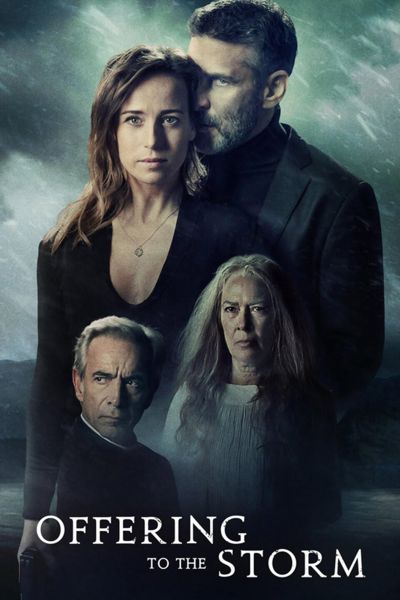 Oh, dear. I think it’s probably been a very long while since I’ve been so underwhelmed by the finale of a trilogy. All the pieces were in place, after the first two entries, for a grandstand finish to the series. But the script basically fumbles things in every conceivable way, pushing to the front elements that you really don’t care about, while all but discarding things that seemed of crucial importance. There is an effort to tie everything together, with the various crimes from its predecessors being linked into an occult conspiracy in which members of a Satanic circle sacrifice baby girls, and receive worldly power in exchange. This aspect is okay, Amaia having to go up against a group whose power is embedded at the highest levels of local society. The creepiest element is perhaps that the sacrifices seem to work, though nobody seems too bothered about this.
Oh, dear. I think it’s probably been a very long while since I’ve been so underwhelmed by the finale of a trilogy. All the pieces were in place, after the first two entries, for a grandstand finish to the series. But the script basically fumbles things in every conceivable way, pushing to the front elements that you really don’t care about, while all but discarding things that seemed of crucial importance. There is an effort to tie everything together, with the various crimes from its predecessors being linked into an occult conspiracy in which members of a Satanic circle sacrifice baby girls, and receive worldly power in exchange. This aspect is okay, Amaia having to go up against a group whose power is embedded at the highest levels of local society. The creepiest element is perhaps that the sacrifices seem to work, though nobody seems too bothered about this.
Unfortunately, it doesn’t gel well with the elements carried forward from the first two movies, and a lot of the elements that should be shocking or disturbing simple are not. The worst example is the identity of the cult’s “inside man”, which is so painfully obvious, you may find yourself yelling at the screen, and Amaia as she ploughs on with her investigation, completely oblivious to the threat. Little less blatant is the plot thread where husband James (Northover) is going back to America because his father is ill. We’ve seen enough in this genre to know that there is no possible way Amaia is going to end up accompanying him, regardless of how much she promises she will. The film seems convinced it is the first ever to use this device, to demonstrate how its dedicated, troubled detective has her priorities skewed.
This somewhat ties into the whole fidelity subplot, which did nothing except make us (Chris especially) lose empathy for the lead character. In this installment, Amaia just does not seem as “heroic” as previously. I get that the pressure on her is building. But I would have preferred it to lean into the saying, “Hard times breed strong women.” There’s just too many occasions on which she breaks down and starts sobbing instead. Some of it may be justified: there’s the uncertainty about the fate of her mother, for example, who was last seen plunging into a flood-swollen mountain river. This is resolved. In about the least satisfactory way possible. At least it is addressed. Remember the “Basajaun”? Because the makers here clearly did not.
At 139 minutes, this is the longest of the trilogy, and you’ll be forgiven if you think it feels that way too. Rather than being led by the film, all too often we found ourselves ahead of it, and then having to wait for the plot and characters to catch up with what we had already figured out. We also ended up rolling our eyes heavily at some of the plot developments, such as the mother of a sacrificed baby acquiring some dynamite and using it to blow open the vault where her child is buried. Wait, what? It’s a shame, that after two films which did so much right, the third does goes wrong in so many different ways.
Dir: Fernando González Molina
Star: Marta Etura, Leonardo Sbaraglia, Carlos Librado “Nene”, Benn Northover
 Yes, I went there again. After Barbie Spy Squad, I’ve gone back to the plastic fantastic, for another entry in the crossover action heroine animated industry. This isn’t the first review here to cover a female take on the classic novel. La Femme Musketeer had already gone there, but the major difference there was, as the title implies it only had one woman, who had to keep her sex under wraps. Here, while the setting remains pre-revolutionary France, the wannabe Musketeer is openly a lady. On the high level, it is a fairly loyal adaptation, with teenage heroine Barbie – here called Corinne (Sheridan) – heading to Paris to fulfill her long-held ambition of becoming a Musketeer.
Yes, I went there again. After Barbie Spy Squad, I’ve gone back to the plastic fantastic, for another entry in the crossover action heroine animated industry. This isn’t the first review here to cover a female take on the classic novel. La Femme Musketeer had already gone there, but the major difference there was, as the title implies it only had one woman, who had to keep her sex under wraps. Here, while the setting remains pre-revolutionary France, the wannabe Musketeer is openly a lady. On the high level, it is a fairly loyal adaptation, with teenage heroine Barbie – here called Corinne (Sheridan) – heading to Paris to fulfill her long-held ambition of becoming a Musketeer.




 Going off the Wikipedia article about Rose Dugdale, I can’t help feeling this could have been more epic than it was. I mean, a former debutante who, “As an IRA member, took part in the theft of paintings worth IR£8 million, a bomb attack on a Royal Ulster Constabulary station using a hijacked helicopter, and developed a rocket launcher” which used – I kid you not – packets of biscuits to absorb the recoil. There’s so much there, it feels a shame the movie focuses almost entirely on the art theft. This was carried out in 1974, raiding a stately home in rural Ireland (fun fact: the house was used as a location in
Going off the Wikipedia article about Rose Dugdale, I can’t help feeling this could have been more epic than it was. I mean, a former debutante who, “As an IRA member, took part in the theft of paintings worth IR£8 million, a bomb attack on a Royal Ulster Constabulary station using a hijacked helicopter, and developed a rocket launcher” which used – I kid you not – packets of biscuits to absorb the recoil. There’s so much there, it feels a shame the movie focuses almost entirely on the art theft. This was carried out in 1974, raiding a stately home in rural Ireland (fun fact: the house was used as a location in 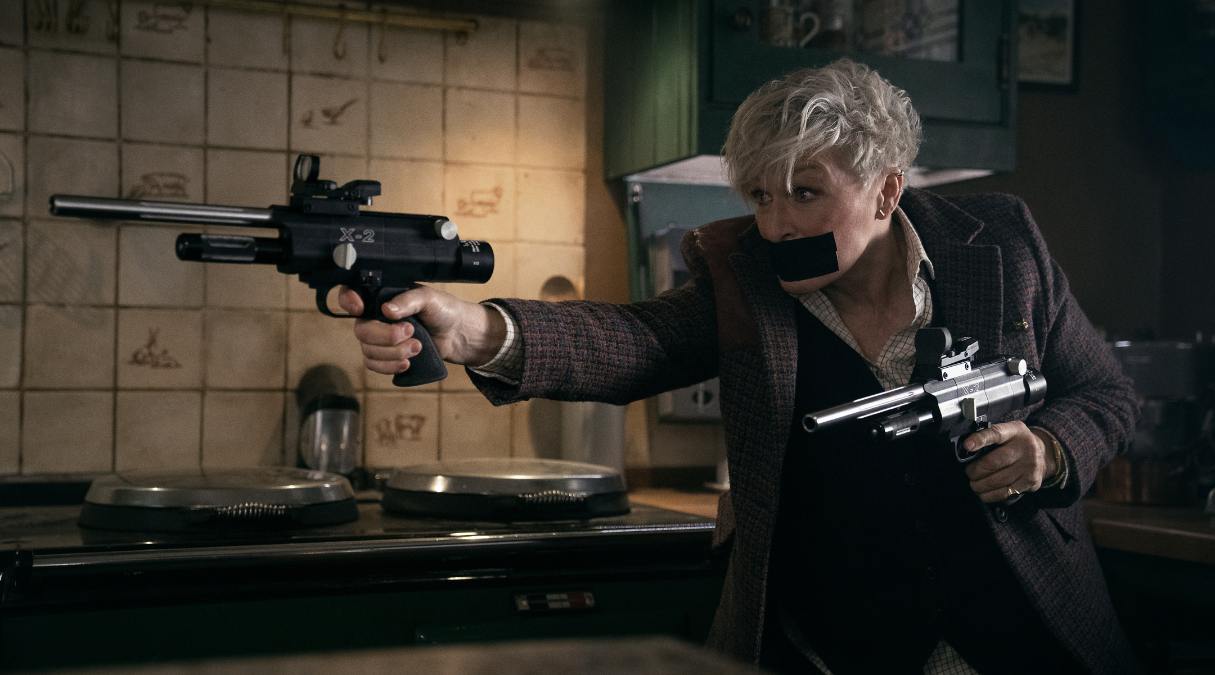 ★★★
★★★ Calamity Jane is one of the larger-than-life figures who populated the Wild West in its later days, as it was gradually becoming civilized. The truth about who she was is hard to determine, with verifiable facts hard to come by. But like Robin Hood, this just makes her raw clay, to be moulded into whatever shape writers and film-makers want. In Jane’s case this means her over the decades being played by anyone from
Calamity Jane is one of the larger-than-life figures who populated the Wild West in its later days, as it was gradually becoming civilized. The truth about who she was is hard to determine, with verifiable facts hard to come by. But like Robin Hood, this just makes her raw clay, to be moulded into whatever shape writers and film-makers want. In Jane’s case this means her over the decades being played by anyone from  I only remembered about this when looking at our preview for last year, and realizing I’d not heard anything more about it. Turns out it was released on April 26th, to what was apparently “limited theatres,” the same day it hit on-demand. I must have missed the memo. So, here we are, and it’s very much a bit of a mixed bag. The scenario is interesting, if vague. Initial tension building is well-done, but the further it went on, the more it struggled to hold my interest. It’s a post-apocalyptic scenario, with the oxygen level of the atmosphere rapidly depleted to a lethally low percentage. This wiped out almost everyone – though where all the corpses went is one of many unanswered questions.
I only remembered about this when looking at our preview for last year, and realizing I’d not heard anything more about it. Turns out it was released on April 26th, to what was apparently “limited theatres,” the same day it hit on-demand. I must have missed the memo. So, here we are, and it’s very much a bit of a mixed bag. The scenario is interesting, if vague. Initial tension building is well-done, but the further it went on, the more it struggled to hold my interest. It’s a post-apocalyptic scenario, with the oxygen level of the atmosphere rapidly depleted to a lethally low percentage. This wiped out almost everyone – though where all the corpses went is one of many unanswered questions. This was my favourite new television show of 2024, and might have been my pick overall. It’s a very strong mix of action and drama, with a fabulous cast of characters. I think I might have to go back to the first season of
This was my favourite new television show of 2024, and might have been my pick overall. It’s a very strong mix of action and drama, with a fabulous cast of characters. I think I might have to go back to the first season of 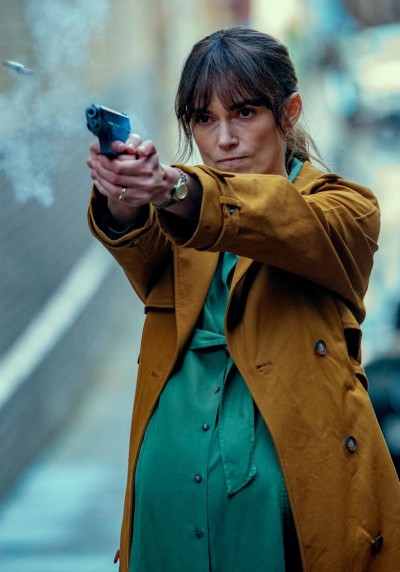 Reed calls in her top assassin, Sam (Whishaw), to protect Helen, fearing she might also be targeted. He has a history with Helen, dating back to before the birth of her children with Wallace. Things spiral out of control, involving the suspicious death of the Chinese ambassador, his missing daughter, a previous hit Sam botched, and Helen’s relentless pursuit of revenge, while trying to keep her family life intact. It’s a lot of balls to keep in the air, but the script does a fine job of avoiding confusion, with the wrap-up proving particularly admirable in its clarity. While I’ve read complaints about it being implausible, I have definitely seen worse. There’s room for both this, and more grounded spy shows like Slow Horses.
Reed calls in her top assassin, Sam (Whishaw), to protect Helen, fearing she might also be targeted. He has a history with Helen, dating back to before the birth of her children with Wallace. Things spiral out of control, involving the suspicious death of the Chinese ambassador, his missing daughter, a previous hit Sam botched, and Helen’s relentless pursuit of revenge, while trying to keep her family life intact. It’s a lot of balls to keep in the air, but the script does a fine job of avoiding confusion, with the wrap-up proving particularly admirable in its clarity. While I’ve read complaints about it being implausible, I have definitely seen worse. There’s room for both this, and more grounded spy shows like Slow Horses.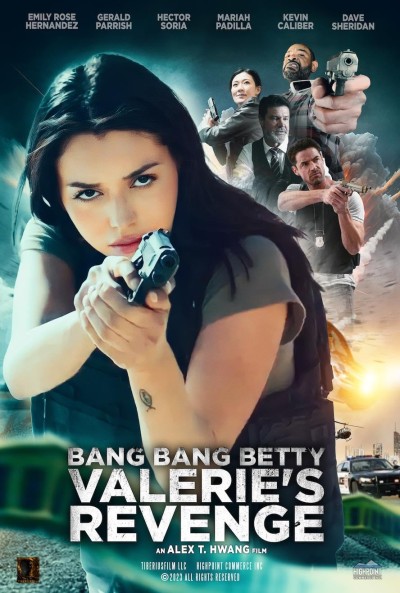 This one ends by informing us definitively that “Bang Bang Betty will return.” The statement may cause some confusion to viewers in this installment, because Bang Bang Betty is not present to begin with. No, this sequel to
This one ends by informing us definitively that “Bang Bang Betty will return.” The statement may cause some confusion to viewers in this installment, because Bang Bang Betty is not present to begin with. No, this sequel to  This is one of those films where the same person wrote, directed and starred in it, and once again, the results illustrate the problems with such an endeavour. Almost any project will benefit from an external perspective which can offer constructive criticism, but when this is removed, the flaws typically end up multiplied. That said, this isn’t terrible. I think Riches the screenwriter comes out best, with a story which bypasses the usual cliches of urban storylines e.g. gangster rising out of the gutter, and does offer some genuine surprises. Director Riches also gets some points for restraint on the soundtrack front; it’s not comprised entirely of her mates rapping badly.
This is one of those films where the same person wrote, directed and starred in it, and once again, the results illustrate the problems with such an endeavour. Almost any project will benefit from an external perspective which can offer constructive criticism, but when this is removed, the flaws typically end up multiplied. That said, this isn’t terrible. I think Riches the screenwriter comes out best, with a story which bypasses the usual cliches of urban storylines e.g. gangster rising out of the gutter, and does offer some genuine surprises. Director Riches also gets some points for restraint on the soundtrack front; it’s not comprised entirely of her mates rapping badly.  The Baztan trilogy consists of three movies, based on the novels by Dolores Redondo. The setting for these is a small area in the Basque country of Spain, not far from the border with France. Much like the small-town English villages such as Miss Marple’s St. Mary Mead, or Death in Paradise‘s Honoré, the murder rate in this charming and picturesque area appears to rival that of a South American war-zone. I guess you can describe the series as Español negro, being a Mediterranean-based version of Nordic noir. Like those, you have a detective with a troubled past, a history that frequently seeps into her current life, They are investigating crimes resulting from what’s unquestionably the darker side of human nature, and the results are uncomfortably close to home.
The Baztan trilogy consists of three movies, based on the novels by Dolores Redondo. The setting for these is a small area in the Basque country of Spain, not far from the border with France. Much like the small-town English villages such as Miss Marple’s St. Mary Mead, or Death in Paradise‘s Honoré, the murder rate in this charming and picturesque area appears to rival that of a South American war-zone. I guess you can describe the series as Español negro, being a Mediterranean-based version of Nordic noir. Like those, you have a detective with a troubled past, a history that frequently seeps into her current life, They are investigating crimes resulting from what’s unquestionably the darker side of human nature, and the results are uncomfortably close to home. I’ve traveled a fair bit around Spain and Mediterranean Europe in my time, and the weather was never as unremittingly
I’ve traveled a fair bit around Spain and Mediterranean Europe in my time, and the weather was never as unremittingly  We jump ahead about a year for the second installment. Amaia Salazar (Etura) has now had the baby she announced she was expecting during the first film, and is adjusting to the need for balance between her career and motherhood, with her husband, James. After completing her maternity leave, she returns to work, and is put on a case of church desecration with cult undertones, at the request of the enigmatic Fr. Sarasola (Arias). This is tied to the Cagots, a historically persecuted group native to the region. Simultaneously, there is an ongoing string of murderers committing suicide, each leaving behind a one-word message: “Tartalo”. It’s a reference to a baby-eating giant from Basque mythology, and seems to be linked to the cave of remains found in the previous film.
We jump ahead about a year for the second installment. Amaia Salazar (Etura) has now had the baby she announced she was expecting during the first film, and is adjusting to the need for balance between her career and motherhood, with her husband, James. After completing her maternity leave, she returns to work, and is put on a case of church desecration with cult undertones, at the request of the enigmatic Fr. Sarasola (Arias). This is tied to the Cagots, a historically persecuted group native to the region. Simultaneously, there is an ongoing string of murderers committing suicide, each leaving behind a one-word message: “Tartalo”. It’s a reference to a baby-eating giant from Basque mythology, and seems to be linked to the cave of remains found in the previous film. Oh, dear. I think it’s probably been a very long while since I’ve been so underwhelmed by the finale of a trilogy. All the pieces were in place, after the first two entries, for a grandstand finish to the series. But the script basically fumbles things in every conceivable way, pushing to the front elements that you really don’t care about, while all but discarding things that seemed of crucial importance. There is an effort to tie everything together, with the various crimes from its predecessors being linked into an occult conspiracy in which members of a Satanic circle sacrifice baby girls, and receive worldly power in exchange. This aspect is okay, Amaia having to go up against a group whose power is embedded at the highest levels of local society. The creepiest element is perhaps that the sacrifices seem to
Oh, dear. I think it’s probably been a very long while since I’ve been so underwhelmed by the finale of a trilogy. All the pieces were in place, after the first two entries, for a grandstand finish to the series. But the script basically fumbles things in every conceivable way, pushing to the front elements that you really don’t care about, while all but discarding things that seemed of crucial importance. There is an effort to tie everything together, with the various crimes from its predecessors being linked into an occult conspiracy in which members of a Satanic circle sacrifice baby girls, and receive worldly power in exchange. This aspect is okay, Amaia having to go up against a group whose power is embedded at the highest levels of local society. The creepiest element is perhaps that the sacrifices seem to  Back when I reviewed
Back when I reviewed